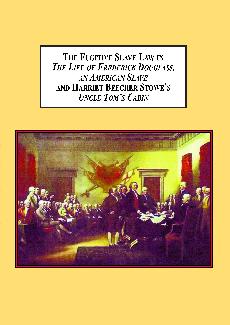Fugitive Slave Law in The Life of Frederick Douglass, an American Slave and Harriet Beecher Stowe's Uncle Tom's Cabin: American Society Transforms Its Culture
We are currently unable to ship to the EU countries at this time. We apologize for this inconvenience.

| Author: | Del Guercio, Gerardo | |
| Year: | 2013 | |
| Pages: | 196 | |
| ISBN: | 0-7734-4518-8 978-0-7734-4518-5 | |
| Price: | $159.95 + shipping | |
| (Click the PayPal button to buy) | ||
This book shows how abolitionists used rhetoric and discourse, rather than violence, to change opinions about slavery. Books like Uncle Tom’s Cabin incite people to take action and they provoke a sense of urgency about the matter. Less than a decade before an impending civil war the United States enacted the Compromise of 1850, which among other things revived the Fugitive Slave Law of 1793 in a more aggravated form. The main stipulation of the law was to impose strict monetary and legal penalties against those who aided the escape or impeded the capture of fugitive slaves. Frederick Douglass and Harriet Beecher Stowe urged Americans to break the Fugitive Slave Law and free blacks across America. These are the most important texts from the American Antebellum Era that dealt with slavery and emancipation. This book explores the implications of the Fugitive Slave Law and the impact that these two figures had during that time period in American history. The argument is that Douglass and Stowe used language instead of violence to convince Americans to break the law, and that not all Americans agreed with the law.
Reviews
“In retrospect, more than 160 years later, we see in the works of Stowe and Douglass, but also those of Hawthorne and Melville, and many others as well, the captivating force of literature and politics in a signal moment of human history, and we see that these powers remain momentous in our own time.”
Prof. Robert T. Tally, Jr.
Texas State University
“Using the work of figures as diverse as Hegel and Bercovitch, Del Guerico argues persuasively that the master-slave rhetoric of antebellum America was rendered inefficient – if not contradictory – by the social realities of their time.”
Prof. Ricardo Miguel-Alfonso
“Both writers subscribe to the universal law of our common humanity and this book traces their efforts to win the hearts and minds of nineteenth-century readers.”
Prof. Marilyn Walker,
The National Technical Institute for the Deaf
"Gerardo Del Guercio offers an astute and in-depth examination of the implications of the Fugitive Slave Law of 1850 and a fresh scholarly look at the impact that Frederick Douglass' 1845 Narrative and Harriet Beecher Stowe's Uncle Tom Cabin (1852) had on Antebellum America...[it] is remarkable in a variety of respects. It is an illuminating and learned book that addresses a large audience thanks to its clarity. It makes interesting reading for those concerned with slavery, abolition, gender and race; for professors, graduate students and advanced undergraduate students."
GRAAT Anglophone Studies
Anne-Claire Levy
"Gerardo Del Guercio offers an astute and in-depth examination of the implications of the Fugitive Slave Law of 1850 and a fresh scholarly look at the impact that Frederick Douglass' 1845 Narrative and Harriet Beecher Stowe's Uncle Tom['s] Cabin (1852) had on Antebellum America. ... It is an illuminating and learned book that addresses a large audience thanks to its clarity." -Prof. Anne-Claire Lévy, Université Sorbonne Nouvelle-Paris III
Prof. Robert T. Tally, Jr.
Texas State University
“Using the work of figures as diverse as Hegel and Bercovitch, Del Guerico argues persuasively that the master-slave rhetoric of antebellum America was rendered inefficient – if not contradictory – by the social realities of their time.”
Prof. Ricardo Miguel-Alfonso
“Both writers subscribe to the universal law of our common humanity and this book traces their efforts to win the hearts and minds of nineteenth-century readers.”
Prof. Marilyn Walker,
The National Technical Institute for the Deaf
"Gerardo Del Guercio offers an astute and in-depth examination of the implications of the Fugitive Slave Law of 1850 and a fresh scholarly look at the impact that Frederick Douglass' 1845 Narrative and Harriet Beecher Stowe's Uncle Tom Cabin (1852) had on Antebellum America...[it] is remarkable in a variety of respects. It is an illuminating and learned book that addresses a large audience thanks to its clarity. It makes interesting reading for those concerned with slavery, abolition, gender and race; for professors, graduate students and advanced undergraduate students."
GRAAT Anglophone Studies
Anne-Claire Levy
"Gerardo Del Guercio offers an astute and in-depth examination of the implications of the Fugitive Slave Law of 1850 and a fresh scholarly look at the impact that Frederick Douglass' 1845 Narrative and Harriet Beecher Stowe's Uncle Tom['s] Cabin (1852) had on Antebellum America. ... It is an illuminating and learned book that addresses a large audience thanks to its clarity." -Prof. Anne-Claire Lévy, Université Sorbonne Nouvelle-Paris III
